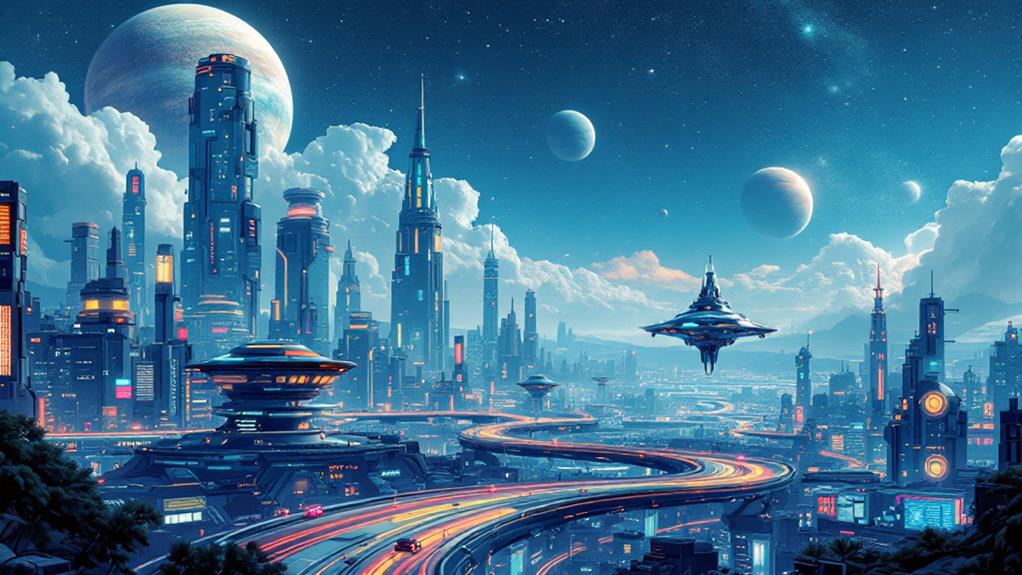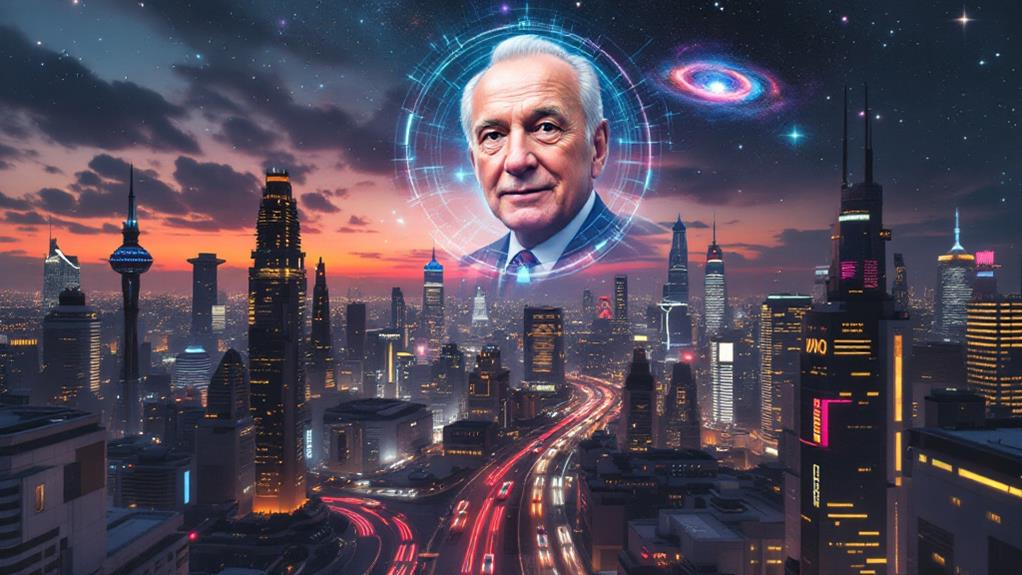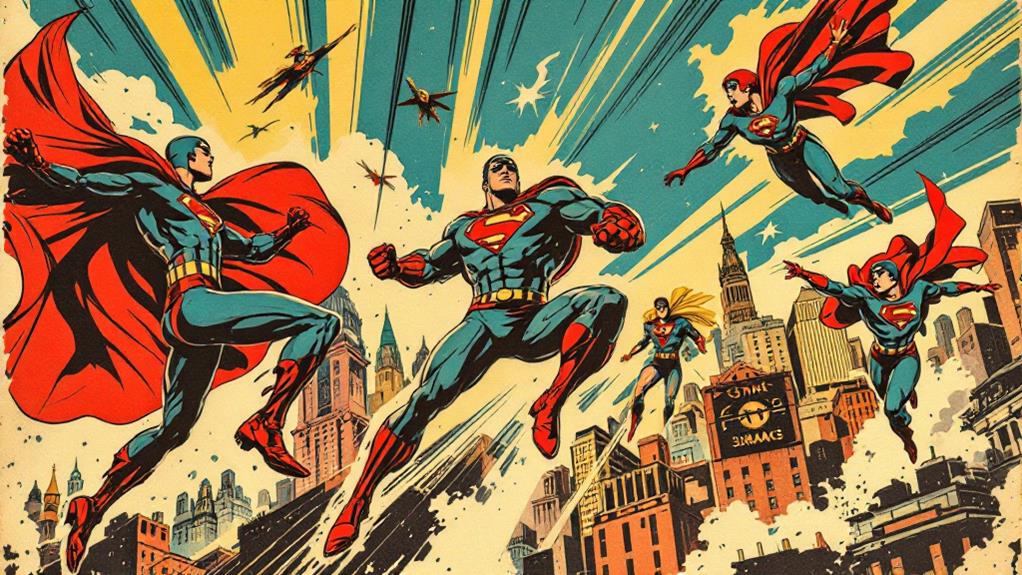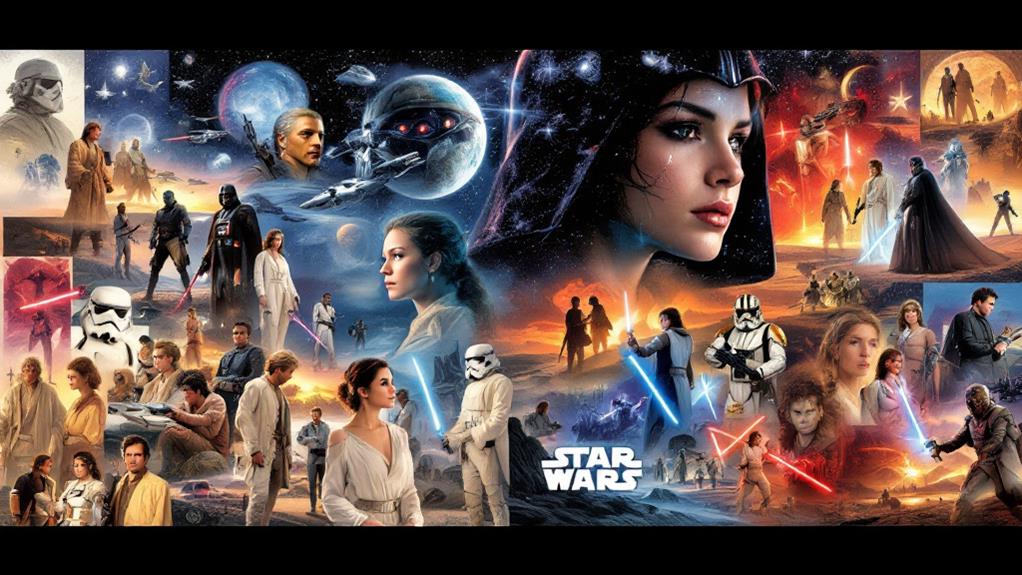The History of Science Fiction: From Imagination to Reality
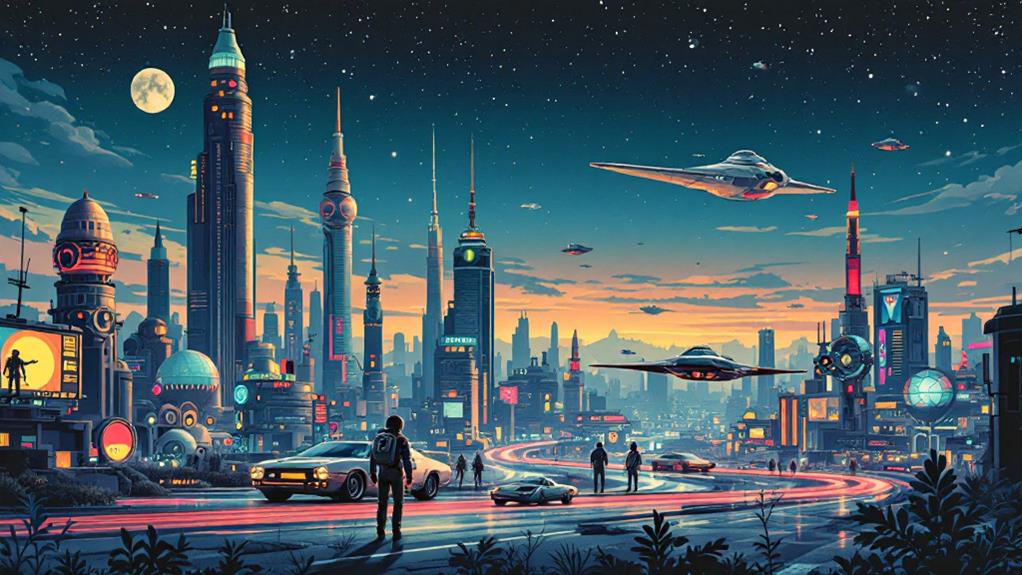
Science fiction started as imaginative tales exploring the wonders and fears of the unknown, from Mary Shelley's "Frankenstein" to Jules Verne's adventurous expeditions. It sparked curiosity and predicted technological innovations, shaping society's views on future possibilities. The genre evolved through the Golden Era, with authors like Isaac Asimov pushing boundaries, and into the New Wave, tackling themes of existential and social issues. Today, sci-fi influences real-world technology and remains crucial in cultural discussions, reflecting our hopes and anxieties about the future. By exploring further, you'll uncover how these speculative ideas continue to impact our technological and cultural landscapes.
Origins of Sci-Fi Literature
When you plunge into the origins of sci-fi literature, you'll find that it all began with humanity's innate curiosity and imagination. This genre emerged as a response to our desire to investigate the unknown and question the fabric of reality. Early sci-fi works often featured utopian visions, offering glimpses of ideal societies, while simultaneously presenting dystopian futures that warned of potential pitfalls. These speculative narratives became a mirror reflecting society's hopes and fears, allowing readers to contemplate technological dilemmas and the consequences of unchecked progress.
In these stories, authors explored the possibilities of space exploration, imagining voyages to distant planets and encounters with alien species. Time travel became a fascinating concept, inviting you to reflect on the nature of time and its impact on human existence. Parallel universes and alternate realities opened the door to boundless creativity, challenging the limits of what's possible. Ecological themes emerged, highlighting humanity's relationship with nature and the environment's fragility.
As you investigate these early sci-fi tales, you'll notice how they tackled societal reflections, dissecting human nature and the complexities of civilization. These foundational elements set the stage for the rich tapestry of science fiction literature that continues to evolve today.
Pioneering Authors and Works
Among the trailblazers of science fiction, a few authors stand out for their groundbreaking contributions that shaped the genre. Mary Shelley, often credited with the birth of science fiction, introduced "Frankenstein" in 1818, weaving early influences of Gothic horror and scientific curiosity. Her work investigated the consequences of man's hubris in creating life, setting the stage for the genre's evolution. Jules Verne followed, capturing imaginations with "Twenty Thousand Leagues Under the Sea" and "Journey to the Center of the Earth." Verne's stories combined scientific accuracy with adventure, inspiring readers to dream of technological advancements.
H.G. Wells, another pioneer, expanded the boundaries of science fiction with "The War of the Worlds" and "The Time Machine." His narratives examined themes of extraterrestrial invasion and time travel, pushing the genre towards new domains of possibility. These authors pioneered the genre's evolution by daring to envision the unknown, blending fiction with the potential of future science.
Here are three key takeaways:
- Visionary Concepts: These authors imagined worlds beyond their time.
- Early Influences: They drew inspiration from contemporary science and societal fears.
- Genre Evolution: Their works laid the foundation for modern science fiction.
Sci-Fi's Golden Age
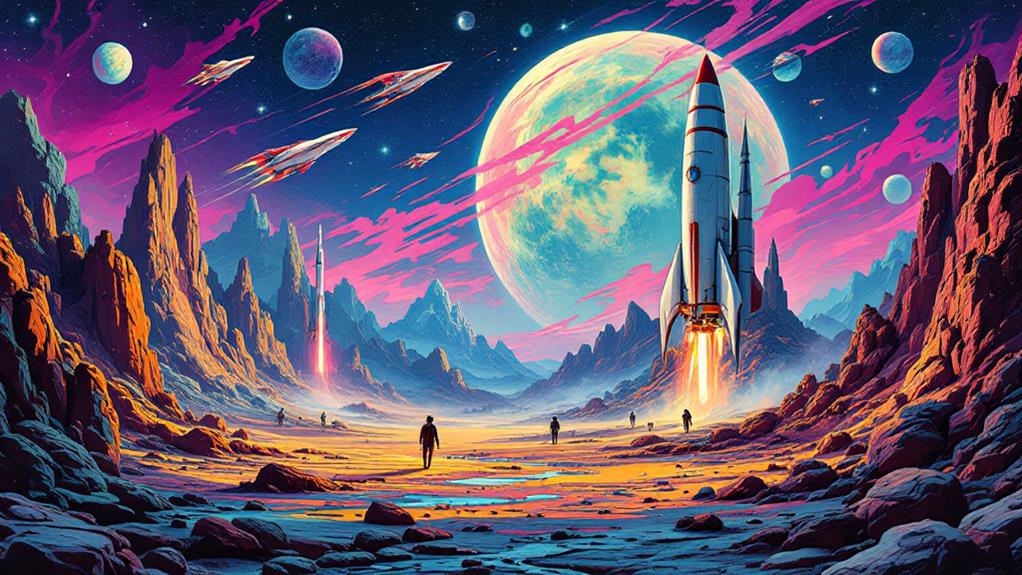
The groundwork laid by early science fiction pioneers set the stage for what many consider the genre's Golden Age. During this time, you saw an explosion of creativity and innovation that pushed the boundaries of speculative fiction. Space investigation became a central theme, capturing the imaginations of readers and reflecting humanity's burgeoning interest in the cosmos. Authors like Isaac Asimov and Arthur C. Clarke examined dystopian futures and alternate realities, weaving complex narratives that asked profound philosophical questions about existence, technology, and society.
In this period, genre evolution was evident as writers experimented with narrative techniques, introducing subgenre diversity that enriched the sci-fi landscape. Stories probed into cultural reflections, mirroring societal anxieties and hopes, while also challenging readers to ponder the possibilities of future advancements and their implications. Literary influences from this time were vast, drawing from both classical literature and contemporary scientific thought, creating a unique fusion that defined the Golden Age.
As a reader, you couldn't help but be captivated by the way these stories combined imagination with intellectual inquiry, offering not just entertainment but a deeper understanding of the human condition and our place in the universe.
The New Wave Movement
Innovation marked the onset of the New Wave Movement in science fiction, shaking the foundations of the genre with its bold, avant-garde storytelling. You see a shift from traditional space operas and hero-centric tales to narratives exploring complex themes and existential questions. This time period, mostly during the 1960s and 1970s, welcomed experimental literature that challenged conventional writing styles.
As a reader, you're drawn into stories that are as much about inner landscapes and psychological depth as they are about futuristic worlds. Authors like J.G. Ballard and Ursula K. Le Guin used the platform to investigate cultural commentary, examining societal norms and human behavior in unprecedented ways. The New Wave Movement pushed you to question reality, morality, and identity.
Consider these defining characteristics of the New Wave Movement:
- Narrative Innovation: Writers experimented with fragmented timelines, unreliable narrators, and stream-of-consciousness techniques.
- Social Critique: Stories served as mirrors to contemporary issues such as civil rights, gender equality, and war, urging you to reflect on real-world problems.
- Emotional Depth: Characters faced internal conflicts, reflecting the turmoil and complexity of human emotions and relationships.
This transformative period in science fiction paved the way for future explorations beyond traditional boundaries.
Science Fiction in Film
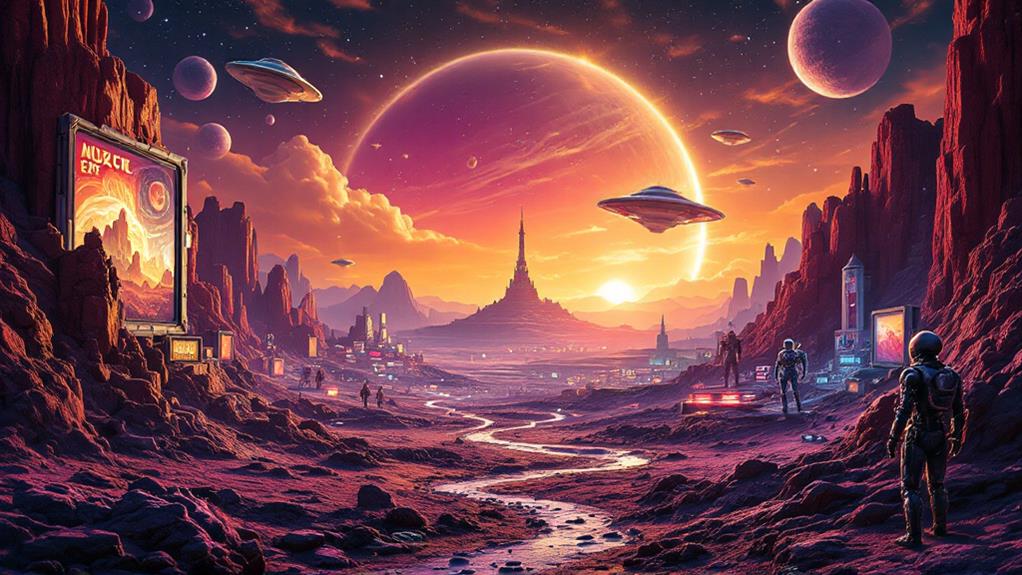
In the sphere of cinema, science fiction has captivated audiences by translating imaginative narratives into stunning visual spectacles. As you investigate the world of sci-fi films, you're transported to domains where space exploration reveals the mysteries of the universe, and alien encounters challenge humanity's understanding of life beyond Earth. Cinematic adaptations of classic sci-fi literature bring these stories to life, often utilizing groundbreaking special effects to depict time travel and post-apocalyptic themes.
Dystopian narratives offer a glimpse into bleak speculative futures, where societies grapple with the consequences of technological and environmental upheaval. These films often examine cyberpunk aesthetics, immersing you in worlds where neon lights illuminate dark cityscapes and advanced tech blurs the line between human and machine. Virtual realities further expand the boundaries of what's possible, inviting you to investigate alternate dimensions and question the nature of existence itself.
Through the magic of cinema, sci-fi movies don't just entertain; they also provoke thought and inspire innovation. Regardless of whether it's through the careful design of futuristic landscapes or the intricate depiction of unfamiliar worlds, science fiction films continue to push the limits of imagination and bring visionary stories to life.
Sci-Fi and Technological Advances
Science fiction in film not only entertains but often predicts and inspires real-world technological advancements. You might find yourself amazed at how concepts like cybernetic organisms or advanced robotics have shifted from the silver screen to reality. Reflect on how artificial intelligence has evolved, with machines now capable of learning and decision-making, echoing the AI seen in countless sci-fi narratives.
Examine these transformative influences:
- Virtual Realities: Films have long investigated the idea of engaging worlds, and now, virtual reality technology lets you step into simulated environments, blurring the lines between fiction and reality.
- Space Exploration: Sci-fi has ignited humanity's passion for the stars, pushing us toward innovations in space travel. Today, missions to Mars and beyond are no longer just dreams; they're active projects.
- Dystopian Societies: These cautionary tales serve as mirrors, reflecting potential futures shaped by unchecked technological growth. They challenge you to reflect on ethical implications and steer society towards positive outcomes.
Even ideas like time travel and alien encounters, while still theoretical, inspire research and debate, pushing the boundaries of what's possible. Sci-fi is more than a genre; it's a catalyst for human progress.
Influence on Popular Culture
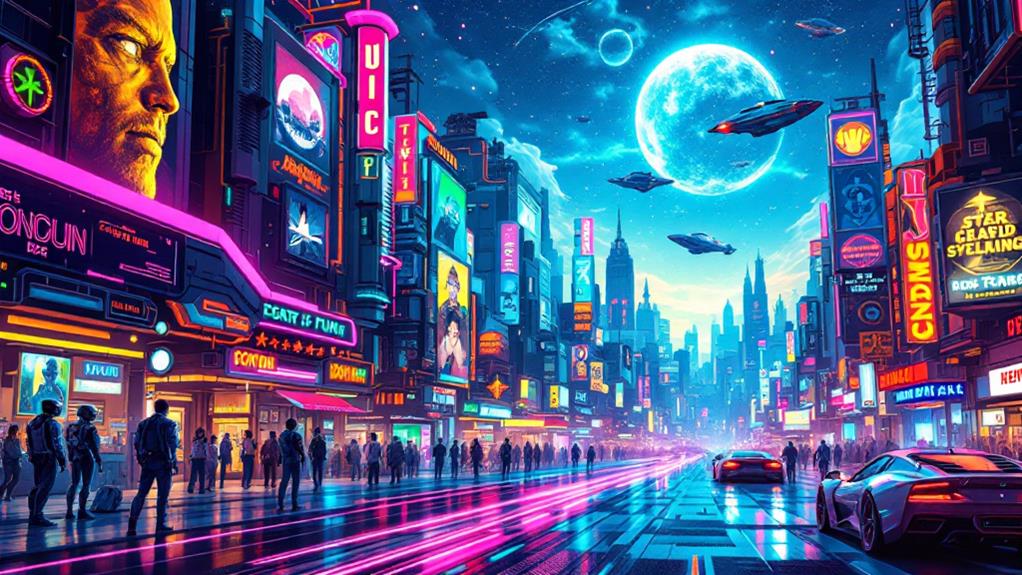
From the pages of novels to the scenes of blockbuster films, science fiction has left an indelible mark on popular culture. You see it in the way imaginative exploration and genre blending have transformed storytelling. Think of how sci-fi combines elements of fantasy, horror, and adventure, creating rich tapestries that captivate audiences. This genre's ability to offer cultural reflection and societal critique gives you a mirror to examine the world. Sci-fi challenges norms, raises questions about speculative ethics, and invites you to ponder future possibilities.
Visual storytelling in science fiction, regardless of the intricate designs of alien worlds or the sleek lines of futuristic technology, pushes the boundaries of what you can imagine. These visuals often draw from mythological influences, adding layers of depth and meaning that resonate on a subconscious level. You're not just watching a story unfold; you're participating in a dialogue about humanity's potential.
Fan communities thrive on this engagement, creating spaces where discussions about plot twists, character development, and ethical dilemmas flourish. Within these communities, the impact of science fiction as a powerful cultural force is undeniable, as it continues to inspire, challenge, and entertain you.
Contemporary Sci-Fi Authors
As you investigate the lively landscape of contemporary science fiction, you'll find authors who continue to push the genre's boundaries and redefine its impact on popular culture. These writers bring fresh perspectives and diverse voices, ensuring that sci-fi remains a dynamic and evolving field. They tackle speculative themes that examine the human condition, technological advancements, and societal changes, all while keeping readers at the edge of their seats.
- Diverse Voices: Contemporary sci-fi is enriched by authors from varied backgrounds who infuse their cultural narratives into their work. This diversity not only broadens the scope of the genre but also allows for more inclusive storytelling.
- Speculative Themes: Authors today investigate themes that challenge our perceptions of reality. They examine alternate futures, question the ethics of technology, and imagine worlds that reflect both our hopes and fears, providing a mirror for today's society.
- Cultural Impact: These authors are not just storytellers; they're cultural commentators. Through their work, they influence societal discourse, prompting readers to think critically about the world around them.
As you immerse yourself in this colorful genre, you'll find that contemporary sci-fi authors are essential in shaping the narratives of tomorrow.
Sci-Fi's Role in Scientific Innovation
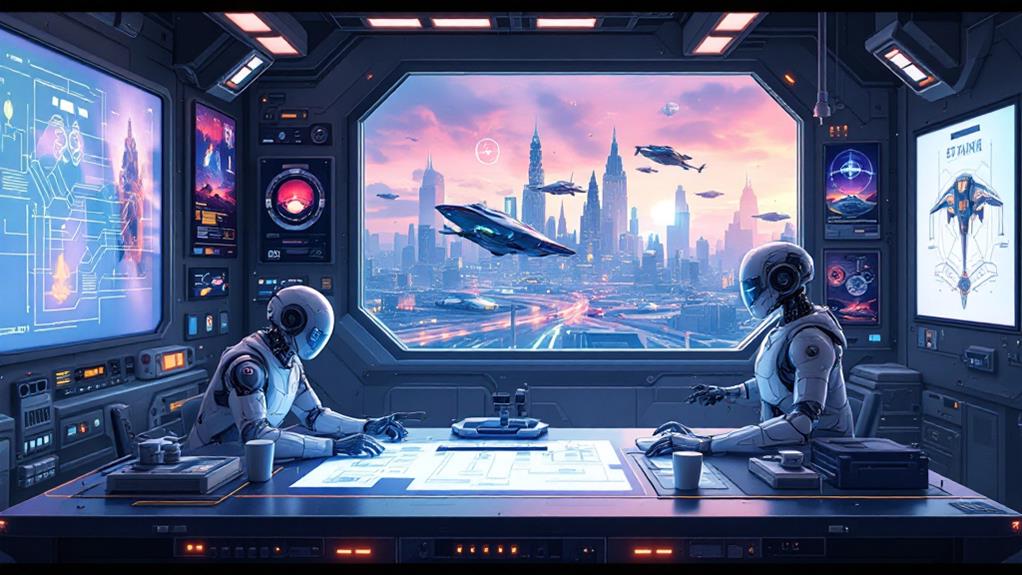
Amidst the domains of imagination and reality, science fiction has often served as a catalyst for scientific innovation. When you immerse yourself in a sci-fi story, you're not just exploring distant galaxies or alternate dimensions; you're engaging with speculative technology that could one day reshape our world. Authors like Arthur C. Clarke and Isaac Asimov have introduced concepts that, while once purely fictional, now influence real scientific endeavors.
Consider how mobile phones resemble the communicators in "Star Trek," or how smart assistants echo the intelligent computers of science fiction lore. These imaginative solutions have sparked curiosity and driven scientists and engineers to turn fiction into fact. By envisioning futures where technology solves complex problems, sci-fi encourages you to think beyond the limits of current science.
Moreover, science fiction doesn't just predict the future; it challenges you to rethink the present. It invites you to question how speculative technology could address today's issues, from climate change to healthcare. As you navigate these narratives, you're not just witnessing creativity—you're seeing a blueprint for potential scientific breakthroughs. Sci-fi's role in innovation isn't just about dreaming; it's about daring to make those dreams a reality.
The Future of Science Fiction
Looking ahead, the future of science fiction promises to be as dynamic and transformative as ever. You'll find it continuously evolving, addressing the needs and challenges of modern society. As global issues become more intertwined, sci-fi's role as a socio-political commentary will only grow stronger. Authors and creators will investigate speculative ethics, challenging you to contemplate the moral implications of new technologies and societal changes. You'll see it not just as entertainment but as a lens to understand and critique the world around you.
Reflect on these key aspects shaping the future of science fiction:
- Technological Advancements: As technology races forward, sci-fi will address the ethical implications of AI, genetic engineering, and virtual realities, pushing you to question the boundaries of humanity.
- Diverse Voices: You'll encounter a broader range of perspectives, as marginalized voices gain prominence in sci-fi, providing new insights into cultural and socio-political landscapes that enrich the genre.
- Environmental Concerns: Climate change and sustainability will drive narratives, encouraging you to ponder humanity's impact on Earth and the ethical responsibilities that come with it.
Science fiction will continue inspiring innovation and introspection, guiding you through an ever-changing world.
